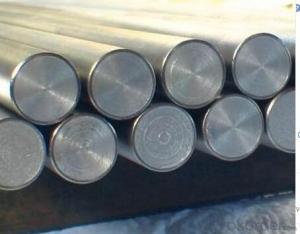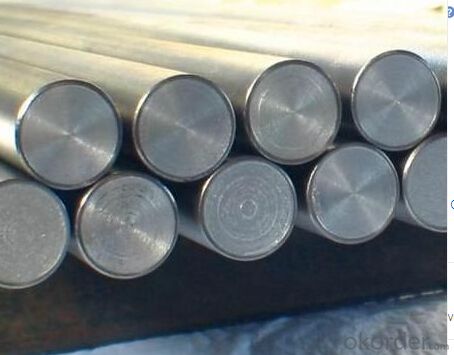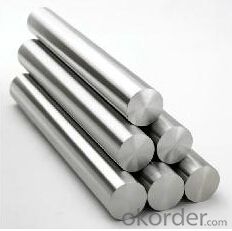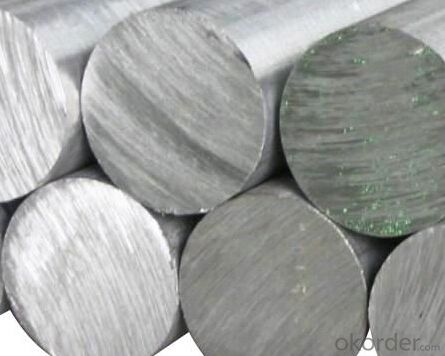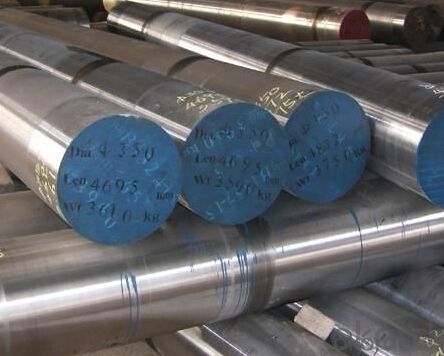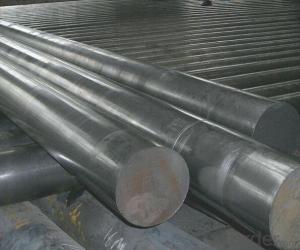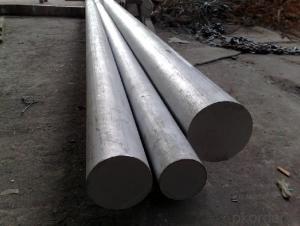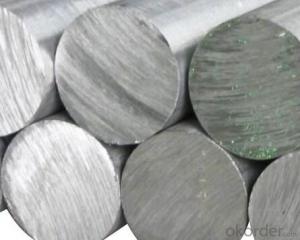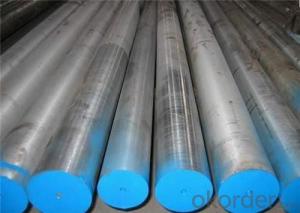Grade SAE51200/ GCr15 / 100cr6 Bearing Steel
- Loading Port:
- Tianjin
- Payment Terms:
- TT or LC
- Min Order Qty:
- 500 m.t.
- Supply Capability:
- 100000 m.t./month
OKorder Service Pledge
OKorder Financial Service
You Might Also Like
Product Description:
OKorder is offering Grade SAE51200/ GCr15 / 100cr6 Bearing Steel at great prices with worldwide shipping. Our supplier is a world-class manufacturer of steel, with our products utilized the world over. OKorder annually supplies products to European, North American and Asian markets. We provide quotations within 24 hours of receiving an inquiry and guarantee competitive prices.
Product Applications:
Grade SAE51200/ GCr15 / 100cr6 Bearing Steel are ideal for structural applications and are widely used in the construction of buildings and bridges, and the manufacturing, petrochemical, and transportation industries.
Product Advantages:
OKorder's Grade SAE51200/ GCr15 / 100cr6 Bearing Steel are durable, strong, and resist corrosion.
Main Product Features:
· Premium quality
· Prompt delivery & seaworthy packing (30 days after receiving deposit)
· Corrosion resistance
· Can be recycled and reused
· Mill test certification
· Professional Service
· Competitive pricing
Product Specifications:
1. Dimensional sizes: Thickness: 14~100mm.Length:3000~5800mm,Diameter :14-500mm
2.Chemical composition:
C | Si | Mn | Cr | Ni | Cu |
Equal or less than | |||||
0.95-1.05 | 0.15-0.35 | 0.20-0.40 | Cr:1.30-1.65 | 0.30 | 0.25 |
3. Grade: SAE51200/ GCr15 / 100cr6
4. Heat Treatment:
Soft annealing: heat to 680-720°C, cool slowly.
Hardness after annealing: Max. 241 HB
Hardening: 820 - 850 °C
Normalizing temperature: 840-880°C
Tempering: 540-680°C
5. Surface requirements: Black, grinding, bright, polish
6. Characters:
1) Comprehensive properties
2) Good performance in cutting and processing after spheroids annealing
3) High hardness and homogenization after quenching and tempering
4) High abrasive resistance and fatigue resistance
7. Payment terms: T/T or L/C at sight
Usage & Applications of Bearing Steel GCr15
Our products have been used in all kinds of areas, such as aviation, aerospace, navigation, nuclear, energy, chemical industry, electronic information, petrochemical, automotive, instrument and meter, Communication ,transportation, and medical instruments, etc. Bearing ring,steel rolling mill ,machinery, 100Cr6 bearing steel ball is widely used in high-speed and low-noise bearing, bicycle, motorcycle, automobile, bags, electronics.
Packaging & Delivery of Bearing Steel GCr15
Mark: Heat No. will be cold stamped and Steel grade, diameter (mm), length (mm), and the manufacturer LOGO and weight (kg) is painted.
Standard seaworthy packing or as customer required
Delivery time: Within 30 days after order is confirmed.
FAQ:
Q1: Why buy Materials & Equipment from OKorder.com?
A1: All products offered byOKorder.com are carefully selected from China's most reliable manufacturing enterprises. Through its ISO certifications, OKorder.com adheres to the highest standards and a commitment to supply chain safety and customer satisfaction.
Q2: How do we guarantee the quality of our products?
A2: We have established an advanced quality management system which conducts strict quality tests at every step, from raw materials to the final product. At the same time, we provide extensive follow-up service assurances as required.
Q3: How soon can we receive the product after purchase?
A3: Within three days of placing an order, we will begin production. The specific shipping date is dependent upon international and government factors, but is typically 7 to 10 workdays.
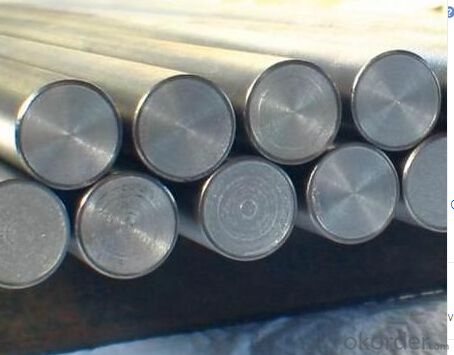
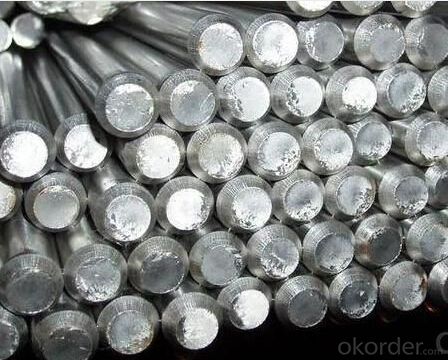
- Q: Can special steel be used in the production of gears?
- Yes, special steel can be used in the production of gears. Special steel, such as alloy steel or tool steel, is often preferred in gear manufacturing due to its high strength, wear resistance, and ability to withstand heavy loads and high temperatures. This steel type ensures gears have the necessary durability and performance required for various applications.
- Q: How does wear-resistant steel protect against abrasive wear?
- Wear-resistant steel protects against abrasive wear by having a high hardness and toughness, which allows it to withstand the abrasive forces and prevent material loss or surface damage. The steel's composition and heat treatment provide it with enhanced resistance to abrasive particles, reducing wear and extending the lifespan of the material.
- Q: What are the emerging trends in the special steel industry?
- Some of the emerging trends in the special steel industry include the growing demand for lightweight and high-strength steel in the automotive and aerospace sectors, the increasing adoption of advanced manufacturing technologies such as additive manufacturing, and the focus on sustainability and eco-friendly practices in steel production. Additionally, there is a rising emphasis on research and development to develop innovative alloys and steel grades that offer superior performance and durability for various applications.
- Q: What are the requirements for special steel used in mining equipment manufacturing?
- Special steel used in the manufacturing of mining equipment must meet specific and rigorous requirements due to the harsh and challenging conditions associated with mining operations. Here are the key requirements: 1. Exceptional strength and toughness are necessary for the special steel used in mining equipment to withstand heavy loads, impact, and abrasion. This enables the equipment to endure the demanding conditions it encounters during mining operations. 2. The special steel used in mining equipment must exhibit exceptional wear resistance properties to minimize wear and prolong the equipment's lifespan. This is crucial because mining equipment is exposed to abrasive materials such as rocks, ores, and minerals. 3. Mining operations often occur in wet and corrosive environments, such as underground mines or near bodies of water. Therefore, it is important for the special steel used in mining equipment to have good corrosion resistance. This prevents rusting and degradation, ensuring the equipment's longevity and reliability. 4. Mining equipment, especially in applications like drilling or cutting, may generate significant heat during operation. Hence, the special steel must possess excellent heat resistance properties to withstand high temperatures without compromising its strength or hardness. 5. The special steel used in mining equipment should be easily weldable and machinable to facilitate the manufacturing process. This ensures that the equipment can be efficiently constructed, repaired, or modified as needed. 6. Mining equipment manufacturers often require special steel to meet specific industry standards and certifications, such as ISO 9001, ASTM, or API. Compliance with these standards guarantees that the steel used in the equipment meets the necessary quality and performance requirements. In conclusion, the requirements for special steel used in mining equipment manufacturing revolve around strength, toughness, wear resistance, corrosion resistance, heat resistance, weldability, machinability, and compliance with industry standards. Meeting these requirements ensures that the steel can withstand the demanding conditions of mining operations and contribute to the durability and performance of the equipment.
- Q: What is the significance of special steel in the medical field?
- Special steel, which is also referred to as medical grade steel, holds a vital role in the medical field due to its distinct properties and importance. Specifically designed and produced to meet the strict requirements of the healthcare industry, special steel's significance in the medical field can be grasped through the following points: 1. Biocompatibility: Special steel demonstrates biocompatibility, meaning it is non-toxic and does not elicit an adverse reaction when it comes into contact with the human body. This makes it an ideal material for medical devices like surgical instruments, implants, and orthopedic tools. 2. Resistance to corrosion: Special steel exhibits high resistance to corrosion and rust, ensuring the endurance and durability of medical instruments. Instruments used in surgical procedures require repeated sterilization, and the corrosive nature of sterilization agents can degrade ordinary steel. Special steel, with its superior resistance to corrosion, can withstand these harsh conditions, decreasing the risk of contamination and preserving the integrity of medical equipment. 3. Mechanical properties: Special steel possesses exceptional mechanical properties, such as high strength, toughness, and ductility. These characteristics are crucial for medical devices as they need to endure the stresses and strains of surgical procedures, maintain their shape, and deliver reliable performance. 4. Compatibility with sterilization: Special steel can withstand various sterilization methods, including steam sterilization, ethylene oxide sterilization, and gamma radiation. This guarantees that medical instruments made from special steel can be effectively sterilized, preventing the transmission of infections and minimizing the risk of contamination during surgeries. 5. Precision manufacturing: Special steel can be shaped into intricate forms and sizes, enabling the production of precise medical instruments. Its superior machinability allows for the creation of fine and sharp edges, which are vital for surgical tools used in delicate procedures. 6. Antibacterial properties: Certain special steels, such as stainless steel, possess inherent antibacterial properties. This characteristic is particularly crucial in the medical field, where preventing infections is of utmost importance. Instruments made from antibacterial special steel can hinder the growth of bacteria, minimizing the risk of post-operative complications. In conclusion, the significance of special steel in the medical field lies in its biocompatibility, resistance to corrosion, mechanical properties, compatibility with sterilization, precision manufacturing, and potential antibacterial properties. These qualities render special steel an indispensable material for the manufacturing of medical devices, ensuring their dependability, durability, and safety for both healthcare professionals and patients.
- Q: What are the different casting techniques used for special steel?
- There are several casting techniques used for special steel, including investment casting, sand casting, centrifugal casting, and continuous casting. Each technique has its own advantages and is suitable for specific applications. Investment casting is known for its precision and ability to produce intricate shapes, while sand casting is cost-effective and versatile. Centrifugal casting is used to create cylindrical shapes with high strength, and continuous casting is employed for mass production of steel products.
- Q: What are the different methods of surface polishing for special steel?
- Some of the different methods of surface polishing for special steel include mechanical polishing, chemical polishing, electropolishing, and abrasive blasting. Mechanical polishing involves using abrasive materials like sandpaper or polishing wheels to remove imperfections and create a smoother surface. Chemical polishing uses chemical solutions to dissolve a thin layer of the steel's surface, resulting in a polished finish. Electropolishing is an electrochemical process that removes surface material through the application of an electric current, resulting in a smooth and shiny surface. Abrasive blasting, also known as sandblasting, involves propelling abrasive particles at high speeds to remove rust, scale, or other surface contaminants, leaving a polished surface.
- Q: How is corrosion-resistant steel used in marine applications?
- Corrosion-resistant steel is widely used in marine applications due to its ability to withstand the harsh and corrosive conditions of the marine environment. It is commonly used in the construction of ships, offshore platforms, and marine equipment. The steel's corrosion resistance properties help to prevent rusting and corrosion caused by saltwater, moisture, and other environmental factors. This increases the durability and longevity of marine structures, ensuring their safe operation and reducing maintenance costs.
- Q: How is special steel graded?
- Special steel is graded based on various factors such as its chemical composition, mechanical properties, and intended application. The grading system provides a standardized classification that helps in identifying and selecting the appropriate type of steel for specific purposes. One common method of grading special steel is through the use of alphanumeric codes. These codes typically consist of a combination of letters and numbers that represent specific characteristics of the steel. For example, the American Iron and Steel Institute (AISI) uses a four-digit numbering system to grade different types of steel alloys. The first digit indicates the main alloying element, such as carbon or manganese, while the subsequent digits provide additional details about the composition and properties of the steel. In addition to the alphanumeric codes, special steel can also be graded based on its mechanical properties. This involves testing the steel's strength, hardness, toughness, and other performance indicators. The results of these tests are then used to assign a specific grade to the steel, which helps users determine its suitability for certain applications. International standards organizations, such as ASTM International and the International Organization for Standardization (ISO), provide guidelines and specifications for the grading of special steel based on these mechanical properties. Furthermore, the intended application of the special steel also plays a significant role in its grading. Certain industries, such as aerospace or automotive, have specific requirements for the materials they use. Therefore, special steel intended for these sectors is graded based on its ability to meet those requirements, such as corrosion resistance, heat resistance, or wear resistance. Special steel grades can also be classified based on their ability to withstand extreme conditions or perform specific functions, such as tool steels for cutting or forming operations. Overall, the grading of special steel involves considering its chemical composition, mechanical properties, and intended application. By utilizing standardized grading systems and specifications, manufacturers, engineers, and other users can easily identify and select the most suitable type of special steel for their specific needs.
- Q: Can special steel be used for making chemical processing equipment?
- Yes, special steel can be used for making chemical processing equipment. Special steel, such as stainless steel or corrosion-resistant alloys, are commonly used in the construction of chemical processing equipment due to their excellent resistance to corrosion, high temperature and pressure, and ability to withstand harsh chemical environments.
Send your message to us
Grade SAE51200/ GCr15 / 100cr6 Bearing Steel
- Loading Port:
- Tianjin
- Payment Terms:
- TT or LC
- Min Order Qty:
- 500 m.t.
- Supply Capability:
- 100000 m.t./month
OKorder Service Pledge
OKorder Financial Service
Similar products
Hot products
Hot Searches
Related keywords
